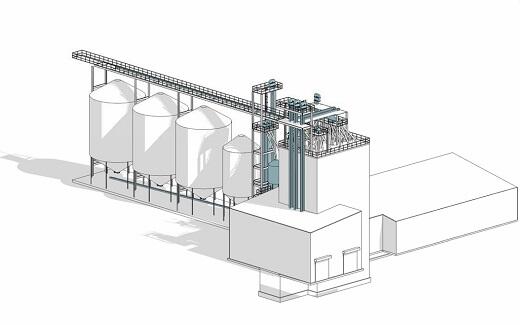Illinois moving ahead with Feed Technology Center

URBANA, Ill. – The University of Illinois has entered a public-private partnership to build a new state-of-the-art Feed Technology Center near campus for the College of Agricultural, Consumer and Environmental Sciences. The highly anticipated new facility will not simply replace the 1920s-era feed mill at the corner of St. Mary’s Road and 4th Street in Urbana; it will cement Illinois as a nationally recognized innovation hub in animal nutrition.
“The new Feed Technology Center will significantly expand our capabilities in the animal nutrition space, which is critical for developing new diets that utilize novel ingredients, improve production efficiency in livestock and poultry, and enhance the health and wellbeing of animals, including dogs and cats,” says Rodney Johnson, head of the Department of Animal Sciences at U of I.
The facility will be capable of delivering 8,000 tons of specialized small-batch research diets per year, along with numerous interdependent capabilities integrated to provide full system services. These include production and storage of grain and forages; storage of specialized diet ingredients; precise diet formulations; milling; ingredient processing; and pre-mixing, mixing, pelleting, extruding, crumbling, bagging, and delivery of animal diets for research.
Researchers in the Department of Animal Sciences, as well as other units across the university, will use the facility to prepare and test animal feed ingredients. The Feed Technology Center will also serve as a launch pad for bigger-picture work designed to advance precision animal agriculture throughout the industry.
Johnson’s vision includes using detailed, frequently collected data on feed ingredients to enable dynamic diet formulation, and on animals to make appropriate management decisions in real time. He says the Feed Technology Center is an integral part of that goal, but other campus assets will help make the vision a reality. For example, by-products of raw materials processed at the new Integrated Bioprocessing Research Laboratory can be incorporated into diets at the Feed Technology Center, and meat products from livestock fed these diets can be studied at the Meat Science Lab.
“The Feed Technology Center is a game-changing asset that will elevate our ability to conduct innovative research while training the next generation of experts in feed science and animal nutrition,” says Kim Kidwell, dean of the College of ACES. “This facility, along with increased capacity in precision animal management, will advance our capabilities to perform industry-relevant research designed to support food production while ensuring animal wellbeing.”
In addition to serving as the site of faculty research, the Feed Technology Center will offer opportunities for students to safely gain hands-on experience with the latest feed technologies, positioning them as strong contenders for leadership positions within the industry. New undergraduate and graduate courses are being created to expand the curriculum in animal nutrition, including a new undergraduate concentration in feed processing technology.
The Feed Technology Center has been in the works for more than two decades, but traditional funding strategies kept it from going forward. A novel public-private partnership, similar to a lease-to-own arrangement, will enable this long-awaited construction project to proceed quickly. Construction is scheduled to begin in early 2019 and the entire project is expected to be completed in early 2020.
The University of Illinois and the College of ACES are making a $6 million financial commitment toward the facility as part of a longstanding commitment to the Illinois livestock industry. Approximately $14 million in private contributions are still needed to reduce the financial burden of the construction on the department and college.
“Our donors are making an investment in the livestock industry in Illinois, and are committing to continuing the university’s preeminence in animal nutrition and feed manufacturing,” says Kimberley Meenen, assistant dean for advancement in the College of ACES. “But this facility won’t be just for us. Together, we will move the industry forward. This facility will make possible animal nutrition innovations that may not have even been considered at this point.”